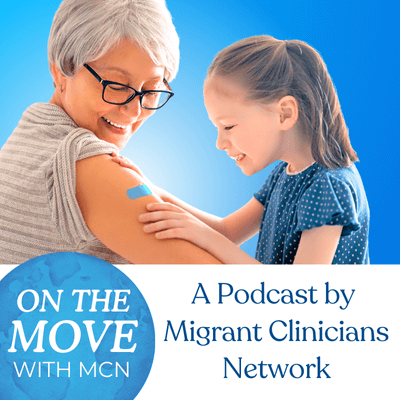Deliana Garcia: Intrepid Champion for Health Justice

[Editor’s Note: Happy Anniversary, Migrant Clinicians Network! We continue to celebrate our 35th anniversary with profiles of some of MCN’s founding members. Here, we profile the life and work of Deliana Garcia, MCN’s Director of International Projects and Emerging Issues. Make sure to read previous months’ profiles of Candace Kugel, FNP, CNM, MS, Migrant Clinicians Network’s Specialist in Clinical Systems and Women’s Health; Karen Mountain, MBA, MSN, RN, Chief Executive Officer; and Ed Zuroweste, MD, Founding Medical Director.]
Deliana Garcia has been a relentless and intrepid champion for health justice with Migrant Clinicians Network for over three decades. Known for her determination, she has dedicated her career to reducing barriers to care. Articulate and erudite, she’s a welcome presence at both the plenary session and the dinner party. Garcia credits her early childhood education and family upbringing for training her to be an eloquent and adroit advocate with an attentiveness to detail. As she retells her life story thus far, each step is anchored and enlivened by her personal relationships -- parents, boyfriends, international flings, a taxi driver, a child in a classroom, a friend, a coworker -- revealing the role that connection and relation play in her life.
Born in El Paso, Texas, Garcia recalls a childhood filled with “diverse cultures, experiences, attitudes, and personalities -- all of which made for a rich jumble.” Her father’s large Mexican-American family could “field three baseball teams,” whereas her mother -- an only child -- was from a family of three, with a tall blond cowboy step-father from Michigan and a mother who was “strong and funny and a tremendous cook” who doted on Garcia and her brother as the only grandchildren in the family. A strict Jesuit education -- she attended a Sisters of Loretto elementary school, followed by a convent high school -- hammered in the importance of thorough and logical expression of ideas. “They didn’t care much what you thought, but you had to tell them where you got your ideas, why they were sound, and defend them to the death,” she said.

[An early photo of Deliana]
After graduating, she attended the University of Texas, Austin, which had just the year before began allowing students of color to attend: “I came to school as part of the one percent,” she recalled. Her rigorous high school education allowed Garcia to place out of freshman year and begin college as a second-semester sophomore. She consequently graduated early, with a degree in communication sciences and disorders.
“Then, I left for Brazil,” she said simply. She was excited for the adventure, but fairly unprepared, with no Portugeuse skills and no connections in the country. Six months in, with plenty of travel across the country under her belt, she returned to the US, fluent in Portugeuse, and began graduate school to become an audiologist.
In her first position as an audiologist, she worked in a pediatric clinic with children five and under. “You could only practice under the direct supervision of a physician, and I couldn’t do it. They didn’t counsel on nutrition, they weren’t serious about mucus extraction, they would just stick tubes in the ears and that was that -- I quit and became a bookstore clerk,” she summarized. Above the bookstore was a women’s counselling collective that was looking for a new director, and so her career path swiveled toward inclusive health provision for underserved people. Shortly thereafter, she went into child assault prevention as a classroom facilitator. “There are only so many stories you can hear, before all of it is unbearable,” she admitted. After one class, one little boy approached her. “I was girding myself. He asked, ‘I want to know if you want to come to my house for dinner.’ I thought, I was so sure it was going to be horrible, that I couldn’t even be open or joyful. So I quit,” she recalled. The tension and drain of the job had reached a breaking point -- and she never did go to the dinner. Her next job was equally as important, but hardly less intense. She became the Communications Director for Planned Parenthood of Central Texas. Shortly thereafter, she had her son.

[A portrait of Deliana and her young son]
The atmosphere at Planned Parenthood was tense. Anti-abortion advocates made working there, even in the communications department, untenable. “It got so bad that people were calling the house to tell me what they were going to do to me. So I quit. I got too scared, and I quit,” she admitted. Her partner at the time, Alan Pogue, had completed a photographic study of farmworkers, and the National Center on Farmworker Health was working with him to put together a Washington, DC exhibit. Shortly thereafter, Garcia joined NCFH. Migrant Clinicians Network at the time was a project of NCFH, and Garcia was tasked with assessing how the nascent MCN should function with the NCFH. Garcia believed MCN needed to spin off into its own nonprofit, which it did -- but not before NCFH let go of Karen Mountain, the project head. Mountain continued to work on MCN, and a year later, Mountain contacted Garcia and invited her to fledge MCN as a self-sustaining non-profit. “We started raising money for Health Network -- TBNet at the time -- and then we got some money from the EPA,” she recalled, and so MCN chugged along.

[Deliana stands up for 'Healthcare Justice for All' with MCN staff including Ed Zuroweste, Candace Kugel, and Karen Mountain]
“What this group was doing at that point was so essential: clinicians who understood that other clinicians needed support,” she said of MCN’s early years. “They needed guidelines, to understand the labor risks, this environment, so many needs, a culture of health -- and to work with Ed, Candace, Karen, all these wonderful people who were so committed -- how could you not want to work with them?”

[Deliana poses for a Giving Tuesday Unselfie with the Health Network team]
At MCN, Garcia has spearheaded the expansion of Health Network to provide bridge case management to any patient, with any health condition or concern, traveling to any place in the world. Her work in family violence prevention, IPV, global health, infectious disease, cost of care, and vaccination has brought MCN accolades and awards. Garcia believes that MCN’s work has been so effective because “we keep trying to look at the essential point of influence and impact -- the place we are most needed -- and we target our response to that place,” she said. “I have a fantastic life -- I’ve had an incredible life when I stop to reflect on it. How have I had this good fortune? It’s been fantastic.” And MCN has been lucky to benefit from her fantastic journey thus far.
Want to support Del’s work? Please help us meet our end-of-year fundraising goal today by donating to Migrant Clinicians Network here. Your much-needed dollars go directly to our critical work in creating and implementing practical solutions at the intersection of vulnerability, migration, and health. We’re transparent about our work and finances, with 91% of our funding going directly to our on-the-ground programs. See what clinicians and advocates have to say on GreatNonprofits, where we have been awarded a “top-rated” nonprofit, and learn more about our finances and governance on GuideStar, where we are recognized with the “Platinum Seal of Transparency”.
Like what you see? Amplify our collective voice with a contribution.
Got some good news to share? Contact us on our social media pages above.
Return to the main blog page or sign up for blog updates here.
- Log in to post comments






